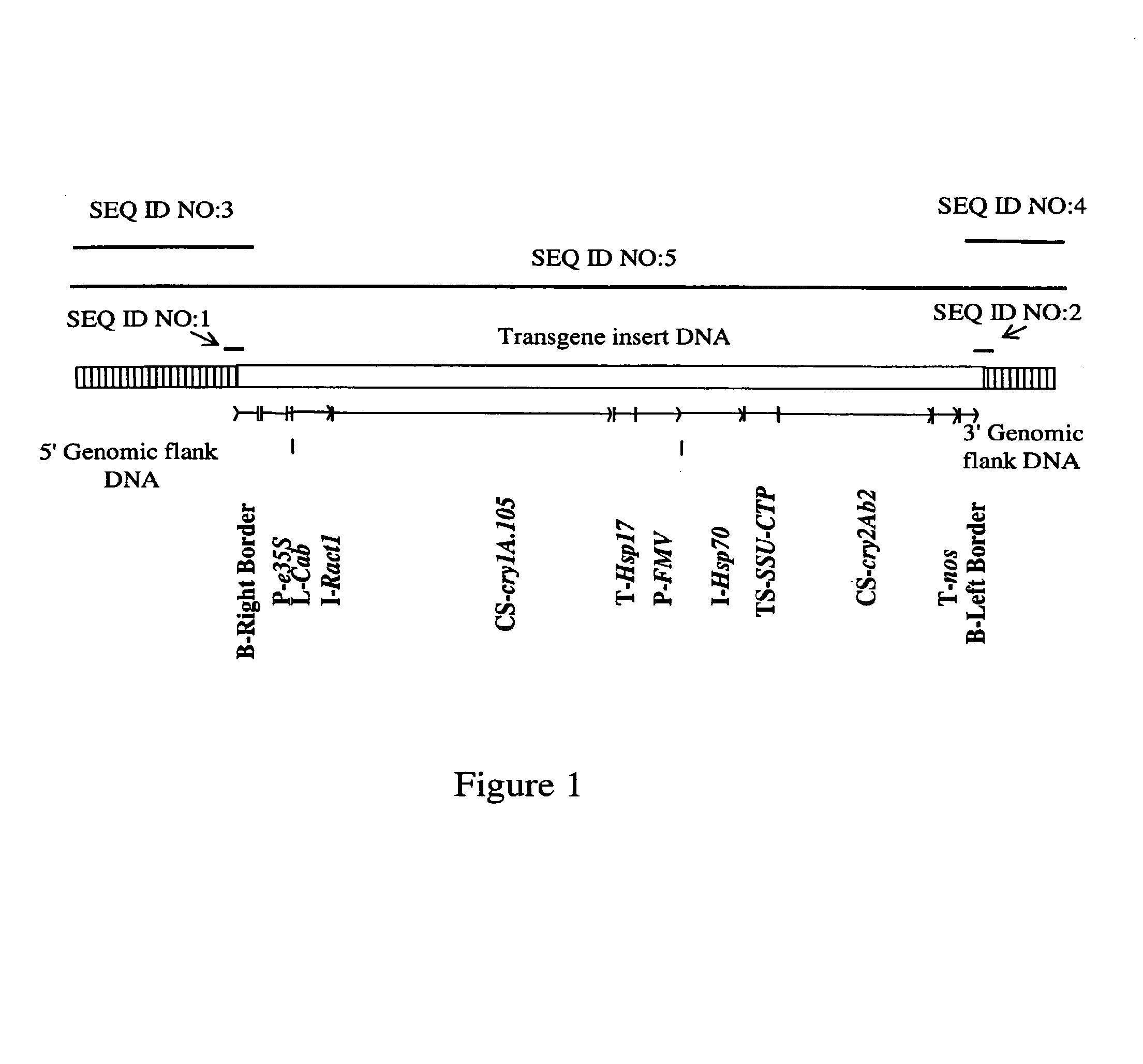Corn plant and seed corresponding to transgenic event MON89034 and methods for detection and use thereof
a technology of transgenic corn and mon89034, which is applied in the field of transgenic corn event mon89034 and plant parts and seeds, can solve the problems of inability to identify with certainty, limit the commercial value of germplasm containing single bt genes, and may not be useful in the field of discriminating between different events
- Summary
- Abstract
- Description
- Claims
- Application Information
AI Technical Summary
Benefits of technology
Problems solved by technology
Method used
Image
Examples
example 1
[0075]This Example illustrates the construction and molecular characterization of transgenic corn event MON89034.
[0076]The corn plant MON89034 was produced by an Agrobacterium mediated transformation process of an inbred corn line with the plasmid construct pMON38850 (the expression cassette is shown in FIG. 1). The transformation method used is similar to that described in U.S. Pat. No. 6,603,061. The plasmid construct pMON38850 contains the linked plant expression cassettes with the regulatory genetic elements necessary for expression of the Cry1A.105 insecticidal protein in corn plant cells. Corn cells were regenerated into intact corn plants consisting of at least about 23,000 different transgenic events. Individual transgenic events (plants) were selected from the population of events that showed integrity of the plant expression cassettes and resistance to Lepidopteran insect larvae feeding damage. A corn plant that contains in its genome the linked plant expression cassettes ...
example 2
[0090]This example illustrates the identification of a corn plant comprising DNA diagnostic for the transgenic corn event MON89034 in its genome and the determination of the zygosity of such corn plant.
[0091]The methods used to identify heterozygous from homozygous progeny containing event MON89034 DNA in its genome are described in a zygosity assay for which conditions are exemplified in Table 3 and Table 4. The exemplary DNA primers used in the zygosity assay are primers SQ2842 (SEQ ID NO: 6), SQ2843(SEQ ID NO:7), SQ6523(SEQ ID NO:10), SQ6524(SEQ ID NO:11), 6FAM™ labeled primer PB880(SEQ ID NO:14) and VIC™ labeled primer PB2931(SEQ ID NO:15). As indicated above, 6FAM and VIC are florescent dye products of Applied Biosystems (Foster City, Calif.) attached to the DNA primer.
[0092]SQ2842 (SEQ ID NO:6), SQ2843(SEQ ID NO:7), SQ6523(SEQ ID NO:10), SQ6524(SEQ ID NO:11), when used together in a thermal amplification reaction in which a biological sample containing template DNA contains DN...
PUM
| Property | Measurement | Unit |
|---|---|---|
| temperature | aaaaa | aaaaa |
| temperature | aaaaa | aaaaa |
| temperature | aaaaa | aaaaa |
Abstract
Description
Claims
Application Information
 Login to View More
Login to View More - R&D
- Intellectual Property
- Life Sciences
- Materials
- Tech Scout
- Unparalleled Data Quality
- Higher Quality Content
- 60% Fewer Hallucinations
Browse by: Latest US Patents, China's latest patents, Technical Efficacy Thesaurus, Application Domain, Technology Topic, Popular Technical Reports.
© 2025 PatSnap. All rights reserved.Legal|Privacy policy|Modern Slavery Act Transparency Statement|Sitemap|About US| Contact US: help@patsnap.com

